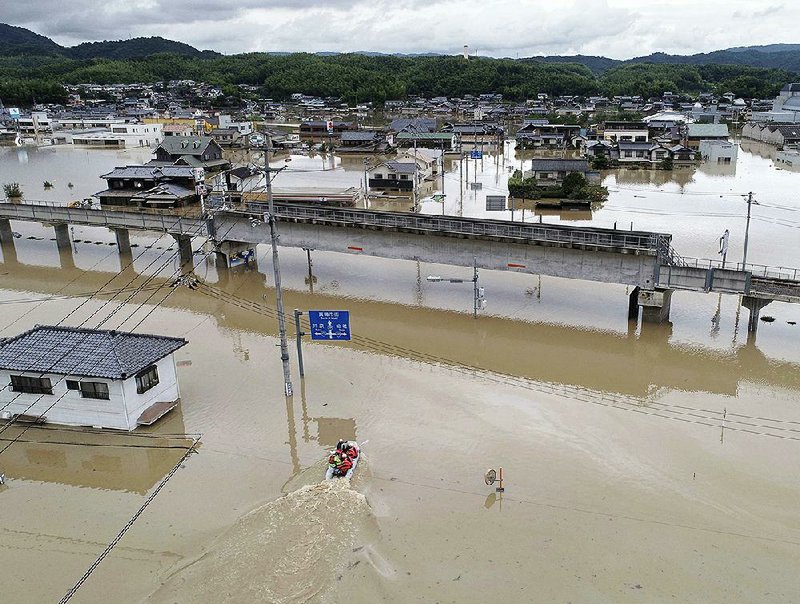HIROSHIMA, Japan -- At least 87 people are confirmed dead, and 13 others are presumed dead, this morning after several days of heavy rainfall set off flooding and landslides in a widespread area, the Japanese government says.
Chief Cabinet Secretary Yoshihide Suga said at a news conference Monday that 68 people were unaccounted for, many of them in the hardest-hit Hiroshima area.
Suga said the 13 people presumed dead had no vital signs when they were found, but they have not been formally declared dead.
People prepared for risky search and cleanup efforts in western Japan, where millions of people were urged to flee their homes.
In Hiroshima, a residential area was strewn with fallen telephone poles, uprooted trees and mud. Some homes were smashed. Others were tilting precariously.
"It gives me a chill thinking what could have happened," said Eiko Yamane, who realized the car she was driving was in danger of flooding in rising waters. She was able to escape.
"Hiroshima prefecture is normally blessed with mild weather and has few natural disasters, so people here have never experienced a situation like this," she added. "I guess they're in a panic."
Among the dead in Hiroshima was a 3-year-old girl whose home was hit by a landslide, Reuters reported.
"It's very painful," said one elderly man watching nearby. "I have a granddaughter the same age. If it were her, I wouldn't be able to stop crying."
The assessment of casualties has been difficult because of the widespread area affected by the rainfall, flooding and landslides. Authorities warned that landslides could strike even after rain subsides. They also advised people to wait for disaster professionals before venturing into damaged homes because of the dangers of exposed electrical lines and hazardous material.
The Japanese government said Sunday that some 40 helicopters were out on rescue missions.
"Rescue efforts are a battle with time," Prime Minister Shinzo Abe told reporters Sunday morning. "The rescue teams are doing their utmost."
Japan's Meteorological Agency had issued rare "emergency warnings" against landslides, rising rivers, strong winds and lightning strikes caused by what it called "historic" rains -- once or twice every 50 years -- in 23 prefectures across the western and central parts of the country. The rains began Thursday and continued into Sunday in many areas.
The agency said three hours of rainfall in one area in Kochi prefecture reached an accumulated 10.4 inches, the highest since such records started in 1976.
More than 1.6 million people were ordered to evacuate their homes, while 3.1 million were put on high alert and urged to do so. Nevertheless, the Kyodo news agency said, many had remained at home.
Okayama prefecture, south of Hiroshima, said in a statement that five people had died, seven were missing and 11 were injured, at least one of them seriously. Nine homes were destroyed and dozens more were damaged, while more than 500 homes were flooded.
Two sisters from an elementary school with just six students on the small island of Nuwa in Ehime prefecture also died, according to Reuters. The younger girl, a first-grader, was a star and the hope of the depopulated island, the principal told NHK.
Information for this article was contributed by Simon Denyer of The Washington Post and by Haruka Nuga and Yuri Kageyama of The Associated Press.
A Section on 07/09/2018
